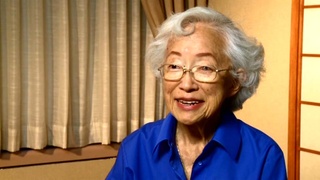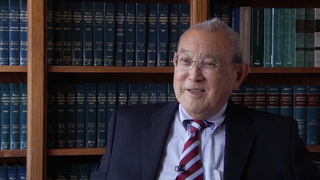Interviews
Questioning Curfew
And, and then one day, I'm dashing home. "Hey Gordon, it's five to eight." I grabbed my stuff and it takes about five minutes to get home so I was just dashing home, and it hit me. A question that I should've faced earlier, just hit me. How come I'm dashing home and all your time keepers are still there? I didn't -- I just needed the question to be raised. I knew I couldn't answer it. You know, without saying, "I can't do it."
I turned around and went back to the library. "Hey, what's, what's the matter?" and I said, "Well, you guys are here." "Well, we got work to do." I said, "I got work to do, too. I decided if you guys are here, I'm gonna, I'm gonna work with you. I'll go back when you guys are ready to go." Nobody turned me in. And I didn't take that until it hit me. And when it hit me I knew, gosh, I can't do it. That's two-faced. The only reason I'm subject to go is because of my -- the way it's stated. I'm a person of Japanese ancestry. In fact, there were, there were Canadians in the group, who weren't even citizens, but they didn't have to go. Well, so I couldn't, I couldn't accept it.
Date: April 26, 1999
Location: Washington, US
Interviewer: Tom Ikeda, Alice Ito
Contributed by: Denshō: The Japanese American Legacy Project
Explore More Videos



Traumatic experiences before camp
(1913-2013) Doctor specializing in obstetrics in Southern California

“Everybody went in like sheep”
(1913-2013) Doctor specializing in obstetrics in Southern California

Discrimination for Nisei doctors
(1928–2016) Daughter of an Issei doctor


Being Denied as a Japanese American Lawyer
(b. 1934) The First Japanese American Appointed to the U.S. Court of Appeals.


Discrimination faced in San Francisco (Japanese)
(b. 1937) A war bride from Yokohama

Accepted by Japanese society as I learned more Japanese (Japanese)
(b. 1979) Sansei Nikkei Brazilian who lives in Oizumi-machi in Gunma prefecture. He runs his own design studio.


Being Confused about Racial Identity in Postwar United States
(b. 1932) Nisei American stage, film, and TV actress

Understanding anti black racism in high school
(b. 1943) Japanese American transgender attorney

Racial discrimination prepared her in becoming the first transgender trial lawyer
(b. 1943) Japanese American transgender attorney
